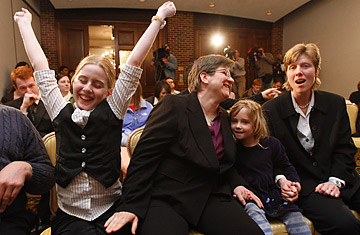
Jen BarbouRoske (R) and Dawn BarbouRoske, with their daughters, Bre and McKinley, react after learning of the Iowa Supreme Court ruling in favor of legalizing gay marriage.
(2 of 2)
But in other ways, the Iowa decision was every bit a match for the California ruling. It took up each argument against gay marriage and dispatched them with a minimum of bombast. An exception was the vivid language employed by the court to cement its position that gays have indeed been discriminated against as a class — a traditional test for whether a group deserves the protection of heightened constitutional scrutiny. "The County does not, and could not in good faith, dispute the historical reality that gay and lesbian people as a group have long been the victim of purposeful and invidious discrimination because of their sexual orientation. The long and painful history of discrimination against gay and lesbian persons is epitomized by the criminalization of homosexual conduct in many parts of this country until very recently. School-yard bullies have psychologically ground children with apparently gay or lesbian sexual orientation in the cruel mortar and pestle of school-yard prejudice." (See TIME's top 10 ballot measures of 2008.)
But the true power of the decision lies not in its equal protection analysis, though it is rooted there. Instead, what sets this decision apart is the frank way in which it raises the issue of religious objections to gay marriage. As the Supreme Court did in Lawrence v. Texas, its seminal 2003 ruling striking down sodomy laws, the Iowa court says that mere moral opprobrium or deeply held values are not enough to warrant legal sanctions or the denial of legal rights. The court then subtly raises the issue of religious opposition to gay marriage, even though the legal briefs by the other side did not.
"Whether expressly or impliedly, much of society rejects same-sex marriage due to sincere, deeply ingrained — even fundamental — religious belief," the court said, before adding that religious views are nonetheless mixed on the subject. "As a result, civil marriage must be judged under our constitutional standards of equal protection and not under religious doctrines or the religious views of individuals. This approach does not disrespect or denigrate the religious views of many Iowans who may strongly believe in marriage as a dual-gender union, but considers, as we must, only the constitutional rights of all people, as expressed by the promise of equal protection for all. We are not permitted to do less and would damage our constitution immeasurably by trying to do more."
Religious opponents to gay marriage were not convinced. "We, the Roman Catholic Bishops of Iowa, strongly disagree with the decision of the Iowa Supreme Court which strikes down Iowa's law defining marriage as a union of one man and one woman," the bishops said in a statement issued Friday. "This decision rejects the wisdom of thousands of years of human history. It implements a novel understanding of marriage, which will grievously harm families and children.
English, the spokesman for the conservative family group, said he's already begun lobbying for an amendment campaign to outlaw gay marriage again. "The first thing we did after internalizing the decision was to walk across the street and begin the process of lobbying our legislators to let the people of Iowa vote," he said.
But until that comes to pass, observers on both sides considering the opinion will likely find the strongest language in the decision to be its final four words: "AFFIRMED. All justices concur."
See TIME's Person of the Year, People Who Mattered, and more.
